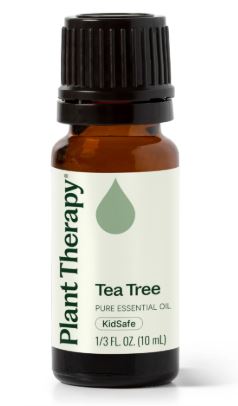Essential oils for MRSA and Staph Infections
This page contains affiliate links. Read my affiliate policy.
There are several essential oils for MRSA that stand above the rest as they’ve been shown to have the highest antibacterial potency for treating Staph aureus or MRSA bacteria.
In case you are new to essential oils, these are not oily liquids like olive oil. They are very concentrated liquid extracts that come from the leaves, bark, stems, and/or flowers of some plants.
Many oils have powerful antibacterial, antifungal and antiviral qualities that help protect the plant from pathogens and disease.
Because each type of plant contains unique chemical antibacterial profiles, different oils will have different kill rates against Staph and MRSA (and other bacteria).
Essential oils have been used for thousands of years, and today they are used as medicines, especially in France where they are often prescribed by medical doctors instead of antibiotic drugs. Of all the beneficial uses they offer, they are widely regarded by medical essential oil experts and studies to be most effective against infectious diseases, both internally and on the skin.
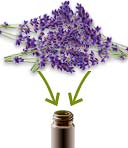
Essential oils are so concentrated that 7 pounds of lavender will make just 10 mL (1/3 ounce) of lavender oil.
Which oils are the best for Staph and MRSA?
Essential oils are anti-infection powerhouses. There have been hundreds of studies clinically proving their effectiveness against pretty much all bacteria, including MRSA and other superbugs. Importantly, these powerful botanical products will kill bacteria without promoting resistance, and they rarely have negative side effects.
Several essential oils in particular are very potent for infection support and have the broadest spectrum of action of all the antibacterial oils1. The following are a sampling of the best essential oils for Staph and MRSA:
|
|
Additionally, oils are often blended together creating unique preparations suited to fight bacterial, fungal or viral infections. These “blends” can offer superior results over single oils, as they create even more complex and “broad spectrum” support against infections.
Tea tree oil or “Melaleuca”
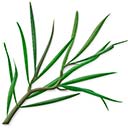
Mild yet highly antibacterial, tea tree (species name Melaleuca alternifolia) has been used for thousands of years by aborigines in Australia. Because it’s so mild, it’s a great choice for babies, infants, the elderly and sensitive skin areas.
A high quality oil will contain well over 100 unique chemical constituents. This oil has been the focus of many studies, articles and medical uses. It has been proven in one study superior to standard medical chlorhexidine treatments or a silver preparation for eliminating MRSA colonization (Journal of Hospital Infection (2004;56:283–6)). Tea tree is considered at safe alternative to drug therapies for treating MRSA skin infections2.
This oil is most commonly used for direct application onto skin infections. It’s also popular in natural antibacterial hand soaps, sanitizing sprays and other household products.
Note: “Tea Tree” is a generic term which can refer to over 300 varieties of the tea tree plant. Be sure to look for “Melaleuca alternifolia“. Find out more about Tea Tree oil.
Oregano
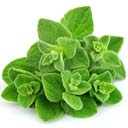
Oregano oil is considered by many experts to be the “big gun” of infection-fighting oils. Oregano (species Origanum vulgare) is high in the naturally occurring phenolic compound called cavracol. Carvacol has been found to be more effective than 18 pharmaceutical drugs, and is very active against MRSA 3.
While oil of oregano has potent antibacterial and antifungal properties, in it’s pure form (un-diluted) it is very “hot” or irritating to the skin and must never be used on the skin without diluting it first (the same goes for Thyme oil). For this reason, it’s not a good choice for young children and the elderly when used on the skin.
Because oregano can be a skin irritant, it is often used internally, usually after diluting it in a carrier oil to reduce it’s hotness. It can also be diluted down and used on skin infections. We’ve found that pure wild-harvested oregano from specific locales in Turkey to be uncommonly potent and to work well against MRSA and Staph. Find out more about Oregano.
Other beneficial oils
Additional essential oils that are also proven active against Staph and MRSA include:
- Eucalyptus
- Rosemary
- Lemongrass
- Cinnamon bark
- Geranium
- Lavender
Essential oils can also provide secondary benefits for healing from infections, such as: immune support, tissue regeneration, reduction of swelling and lymphatic cleaning and support. Oils that support these systems include: ravensara, black cumin, nutmeg, helichrysum, just to name a few. When it comes down to it, essential oils are extremely versatile and can be your best friend when it comes to safe, non-toxic ways to fully heal from infection.
Oil blends provide broader spectrum infection support
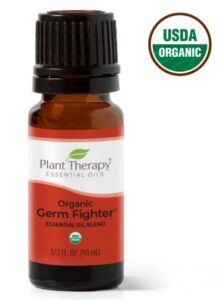
When knowledgeably prepared by oil formulators, blends made of multiple oils can provide unique therapeutic properties to control infections. These blends have a broader spectrum of action than single oils, and certainly antibiotic drugs.
Sometimes, Staph or MRSA may not respond to a single oil. It’s best to try another type of oil, or move to a blended oil. Blends combine the benefits of several different essential oils into a single, easy to use mixture. Oils with complementary constituents or properties can be combined to target specific types of infections and work in synergistic ways. Blends can also provide secondary benefits, such as tissue healing and enhanced immune response properties.
Because of the complex chemistry of these plant extracts and how they effect each other, most blending is best left to experienced formulators. A knowledgeable formulator knows how to bring out the desired properties in a blend while avoiding unwanted and potentially dangerous interactions.
The Germ Fighter essential oil by Plant Therapy has an amazing, uplifting scent. It’s and essential oil blend of: Cinnamon Cassia, Lemon, Eucalyptus Globulus, Clove Bud oil, and Rosemary. It’s also available as an Organic essential oil. This blend is part of the Germ Fighter collection including essential oil, a safe surface cleaner, shower mist and more. Click here or the banner graphic below to get started with Germ Fighter today.
How are oils used for infection support?
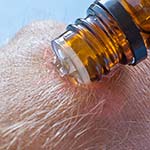
Oils are most commonly used on infected skin areas
Essential oils are unique because of the many ways you can use safely use and enjoy them. Here are the most common ways they’ve been used for infection support:
- Direct skin application: They can be applied to skin cuts and scrapes as a preventative or on boils, abscesses, infected surgical sites and wounds as a treatment.
- Nose: They can be applied inside the nose as a preventative or treatment for colonization with MRSA or Staph.
- Internal: Some oils (only pure and medicinal quality) can be taken internally for short periods of time. Oils can also be rubbed on the bottom of your feet and will then enter your bloodstream at low levels.
- Bathing: Add them to your bath water or wound rinses. Add the oil to dendritic or Epsom salts first to help keep them from floating on the water surface. Note: “Hot” oils that are skin irritants (like oregano and thyme) should not be used for bathing.
- Air diffused: When diffused, they have been proven to reduce bacteria in the air, including airborne MRSA and Staph aureus.
- Lungs: Oils can also be diffused as part of a treatment for infections in the nose and lungs. Diffusing is an easy way to get oils into your lungs and into your body without ingesting them.
- Personal hygiene: Add them into a spray bottle containing witch hazel to make your own personal sanitizing hand spray.
- Cleaning: Add them to water and some liquid soap to make a sanitizing cleaner for your home, kitchen and bathroom. Using antibacterial oils will kill bacteria, and many oils have a pleasing and fresh smell. They can also be added to your laundry.
- Personal care products: Oils can be added to your favorite liquid soap to add a natural antibacterial to them (instead of relying on Triclosan or other chemical antibacterial agents already banned in Europe for causing antibiotic resistance). Use them for hand washing and as a body wash. They can also be added to shampoo and lotions.
Important Note: Not all oils are created equal
Most oils on the market are for industrial, fragrance or perfume purposes, even many found at local health food stores. Many oils are also extracted using chemicals like hexane which are carcinogenic and toxic. And, many are commonly made synthetically (not from the live plant), which creates a product that’s less therapeutic and less healthy for your body. Using poor substitutes for therapeutic purposes is both unsuitable and dangerous to your health.
Unfortunately, reading the labels won’t tell you the truth about what’s in the bottle, as “pure” and “undiluted” don’t guarantee that they really are. Less than 5% of the essential oils made today meet the quality standards needed for therapeutic purposes. This is why finding pure, undiluted, organic (if available), chemical free, wild harvested (if available and sustainable), premium medicinal-quality products is of the utmost importance for internal and external use.
My Favorite Oil Supplier
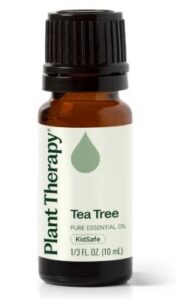
When it comes to having a strong ally against MRSA and Staph or any community infection, I always keep my tea tree oil at hand. Plant Therapy provides professionally formulated oils by Robert Tisserand. I love Plant Therapy due to to their high quality without paying the high price you’ll find with multi-level marketing essential oil companies.
Robert Tisserand is known as one of the world’s foremost experts on essential oil safety. He has worked with Plant Therapy to ensure the safety and quality of their products and has helped them develop a “Kids Safe” line of essential oils. He has over 47 years of experience in the essential oil industry and has spent over 10,000 hours of speaking on the topic of aromatherapy and has written 3 books on the subject.
After using and working with many essential oil companies for over 20 years, Plant Therapy has gained my trust and is the brand I now use and recommend.
Click here to get started with Plant Therapy oils today.
Additional support for using and sourcing oils

Michelle Moore would never be without essential oils. They are a mainstay in her medicine cabinet and have saved her from many doctor visits. When it comes to Staph and MRSA infections, they are one of the front-runners, and have been for many others recovering from MRSA Staph.
Because essential oils are one of Michelle’s favorite treatments, her Program includes 2 full chapters devoted to their specific uses for all types of MRSA Staph infections, from sinus, eye, boils, skin, lung, and other internal infections. Her Program also covers sourcing medical quality products, plus specific guidelines and use protocols. Also included are essential oil expert phone interviews covering specific uses, conditions, pregnancy, children and more.
Getting started with helpful guidance and medicinal quality oils will help provide you with your best chance of success. You can find out more here on Michelle’s program.

- Garlic – an ancient but strong natural remedy for MRSA
- Natural bathing tips for supporting infection healing
- Is it safe to ingest essential oils?
- Using essential oils for cleaning and some favorite recipes
References:
1) Belaiche, Paul. 1979. Traite de phytotherapie et d’aromatherapie. Maloine S.A. Editeur, Paris.
2) A randomized, controlled trial of tea tree topical preparations versus a standard topical regimen for the clearance of MRSA colonization. Journal of Hospital Infection (2004;56:283–6)
3) Oregano could help eradicate MRSA superbug. Nov 2008. The Telegraph. https://www.telegraph.co.uk/health/alternativemedicine/3516157/Oregano-could-help-eradicate-MRSA-superbug.html
4) Medical Aromatherapy, Healing with Essential Oils, Kurt Schnaubelt, 1999.

